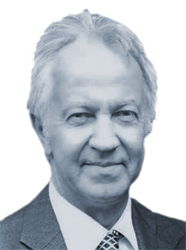 Lennart Johansson is almost certainly heading up a cul-de-sac in his call for an independent investigation into how Jack Warner, another former FIFA vice-president, was able to buy regional World Cup TV rights in the Caribbean for one dollar.
Lennart Johansson is almost certainly heading up a cul-de-sac in his call for an independent investigation into how Jack Warner, another former FIFA vice-president, was able to buy regional World Cup TV rights in the Caribbean for one dollar.
But the re-surfacing of the veteran Swedish administrator within the current world football maelstrom is yet another pointer to a key reason for much of FIFA’s political problems over the last decade or more: a power vacuum after the departure of Joao Havelange from the presidency in 1998.
The extent to which the veteran Brazilian and some of his South American cronies – Ricardo Teixeira and Nicolas Leoz to name but two – may have been picking up illicit commissions on the side from then marketing partner ISL is neither here nor there.
Johansson, unchallenged president of UEFA in 1998, stood against FIFA’s long-serving chief executive Sepp Blatter for the top job that year at the Paris Congress ahead of the World Cup finals and was defeated by 111 votes to 80.
But ongoing talk about envelopes stuffed with cash – the phrase recycled to derisive effect during last year’s Bin Hammam scandal – undermined the credibility of the process. Four years later, though Blatter retained the presidency, he did so against a backdrop of legal action by the European members of his own executive committee.
Blatter’s 2007 victory was the only one not mired in controversy. Hence the perception of a president under siege and able to achieve his aims through political dexterity rather than personal authority.
That perception has been firmed up over the past year by talk from Warner and Bin Hammam, former Asian president and a Blatter supporter then rival, of how they garnered and guaranteed votes for him.
That Warner was the – doubtless happy – recipient of a TV deal for which he paid one dollar has been confirmed by FIFA. What has been strongly denied was that the deal played in part in Blatter benefiting from CONCACAF – and particularly Caribbean – votes when election time came around.
Warner’s allegations about how he obtained his TV deals have infuriated Johansson who vanished from the effective scene after being defeated – fairly and clearly and partly through his own fault in even standing again – by Michel Platini the 2007 UEFA presidential election.
Johansson has described FIFA’s public reputation as tarnished by corruption claims and has called for an independent investigation into all the allegations but particularly Warner’s loose talk.
Johansson told Bloomberg: “I think I’m entitled to talk about it because I was the second candidate at the election in 1998. I lost and now I hear that they bought some votes. For people on the streets FIFA is corruption, is bribery, things like that and they hear it year after year and nothing happens. I can’t see how things like that can change.”
Johansson said FIFA executive committee members had turned a blind eye to the allegations.
He added: “The question is why they stay under these circumstances. They don’t like to talk about it – and the worst thing is it creates a lot of speculation about why they behave like this.”
Last spring, accepting finally that the corruption claims had to be confronted, Blatter said: “It’s not easy to change somewhere where people started by saying you have bought votes in your first election. Who has bought votes in the first election? Go down to Paris in June 8 1998 in the Meridien Montparnasse. I was not there.”
Johansson said, in relation’s to Warner’s claims about buying TV rights for one dollar: “We need to investigate Warner’s comments for the reputation of football not to help Mr Warner. Mr Warner made us aware of really what’s happened by telling us about it. Then if he’s telling a lie that should be proved. We will see.”
FIFA has claimed that selling initial TV rights for next-to-nothing in distant regions was a particular development strategy. If so, why did Johansson – as a FIFA vice-president and long-serving member of the executive committee – not know about it?
By Keir Radnedge






